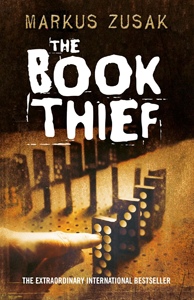I’ve read enough books now to develop a personal taste and know what topics to avoid, but after reading “The Book Thief” (2005) for my book club, maybe I should step out of my comfort zone more. Markus Zusak’s now-classic young-adult novel is about war and populist socialism, two of my least favorite topics, but I ended up loving it.
Zusak writes with economy and poetry for 552 pages made up of short chapters. Since the subject matter daunted me, I set a goal of 50 pages per sitting, and it was always easy to meet.
Death becomes ‘The Book Thief’
The first of Zusak’s many underminings of misconceptions comes with the introduction of our omniscient narrator, Death. (Oh yeah, death is also one of my least-favorite topics.) The usual associations with death go away when we realize that – for the sake of this reading experience, at least – he’s just a dude.

“The Book Thief” (2005)
Author: Markus Zusak
Genre: Young-adult historical fiction
Setting: Germany, World War II
Note to readers: The Book Club Book Report series features books I’m reading for my book club, Brilliant Bookworms.
Obviously, he’s supernatural, and no one can see him until the moment comes, and he’s not good at consoling people (for one thing, his touch is ice cold). But this is merely his job; he doesn’t relish it. Death’s observations and emotions about humanity are recognizably human in their own right.
The figure who most fascinates Death is young German girl Liesel; fortunately, she’s the title character. During the late 1930s when Hitler begins to implement racist policies and prepare a military strategy to annex other countries, Liesel has her own problems (she’s an orphan taken in by strangers) and triumphs (she’s a decent street soccer player, and befriends boy-next-door Rudy).
“The Book Thief” reads like a Nazi-era “A Christmas Story” except with Death providing the warm narration instead of a man looking back from the future. Here, it’s Mama who swears up a blue streak. Maybe it’s a German thing of the times, as saukerl and saumensch (swine boy and swine girl) are commonly heard throughout this gray town outside greater Munich.
Presumably everyone is speaking German, but by peppering in the Deutsch swear words like spices, the English-language novel gains an endearing quality. We’re reminded that people are ridiculous everywhere; the insults are Mama’s vice, as cigarettes are for Papa. Imagining he’s track-and-field star Jesse Owens is Rudy’s vice, and stealing books is Liesel’s.
Growing up as the world falls apart
Because his prose is so clear and dialog so lively, I forgave – and soon embraced – Zusak’s style touches like Death’s pullout observations (bold and centered). Plus, one chapter is a book-within-a-book by Max, the Jew Liesel’s family is hiding in their basement.
At first blush, writing a novel where citizens of Nazi Germany are the sympathetic protagonists seems unlikely, maybe even ill-advised. Zusak pulls it off, and he doesn’t even have to shy away from the Jews’ horrific plight; he tells of various “parades” of Jews through town on their way to a concentration camp.

A lesser, but certainly distinct, flavor of horror comes from the experience of non-racist Germans like Papa, who knows serious punishment – perhaps death – is in store if he goes against Hitler and is found out. More broadly, everyone on Himmel Street is near starvation as Germany’s national socialist policies (including the imprisonment and death-sentencing of many of the best entrepreneurs) have decimated the economy.
“The Book Thief” does everything with a delicate touch. Another prime example is that Liesel is literally a thief, yet we forgive her. Her criminal career begins innocuously with the snatching of a grave-diggers’ handbook, plucked from the ground at her brother’s funeral. With this bland book, we share her joy of learning to read (as taught by Papa) and grasp the rarity of books – as well as food – for poor Germans at this time.
Later, Liesel swipes and reads novels. We don’t read them with her, precisely, but Zusak does give us Max’s aforementioned short story, chronicling his life and the way Liesel and Mama and Papa gave him slivers of sunshine.
The value of words
As we think about the value of words – and the fact that knowing how to read beforehand is the code-cracker – we must confront the fact that Hitler rose to power via being a skilled orator. If words could be taken away from everyone (the evil and the good), perhaps by a supernatural brush like when Death takes souls, would it be a bargain worth making?
For most readers in the midst of a great read like “The Book Thief,” it wouldn’t be worth considering. Instead, fight bad words with good words. That’s part of what Liesel does, in addition to miraculously growing up in what someone with a wider perspective would recognize as hell.
During bombings by the Allies, residents gather in the deepest basement on Himmel Street, and Liesel reads to them. People begin to crave story time. Another selection for my book club, “The Last Bookshop in London” (2021), featured an identical conceit, from the Allies’ perspective. But I won’t leverage charges of theft against Madeline Martin.
Taken together, the two novels provide a striking synergy about how humans kill one another because of charismatic leadership, nationalism, etc., but meanwhile the sane citizens of the world would prefer to not think about any of that.
As it stands, I suppose books – even great ones – are merely an escape. But “The Book Thief” makes me wish we lived in a world where the Markus Zusaks developed massive followings instead of the Hitlers.

